BIG STORY
How Asiwaju Tinubu Provided Total Reform For Health Sector In Lagos As Governor — Leke Pitan
Published
2 years agoon

Dr. Leke Pitan, a former Lagos State Commissioner for Health under a former governor of the state, now the standard bearer of the All Progressives Congress (APC) for the 2023 general elections, Asiwaju Bola Ahmed Tinubu, is a living witness to the radical and enviable reforms carried out in the healthcare sector, while Tinubu was Governor between 1999 and 2007.
In this interview with the Lagos State chapter of the APC Presidential Campaign Council (APP-PCC), under the leadership of a former commissioner for Information and Strategy in the state, Hon. Kehinde Bamgbetan, Leke Pitan revealed the various reforms Tinubu embarked upon as Governor, the hurdles they went through, and how the healthcare sector in the state became the template, not just for other states of the federation, but for the Federal Government of Nigeria. It was a no-holds-barred session. Excerpts…
Can you tell us what you did then as Lagos State Commissioner for Health under Asiwaju Bola Tinubu?
I welcome you and I want to thank the organisers for inviting me to this event. It has given me the opportunity to tell you what we did in the health sector. It’s a wonderful opportunity to speak about the stellar achievements of Asiwaju Bola Ahmed Tinubu’s administration in Lagos State in the health sector, which made the entire country to accept that in health Lagos State was the number one. It is such that cartoonists were using this as an aphorism, while creating their cartoons like creating cartoons where the federal government was sick and the president was being wheeled to one of our general hospitals. That was a popular cartoon at that time, which showed how Nigeria was under drips, which spoke volumes. Each time we talk to the National Council on Health it was made clear that Lagos State was at the forefront. As we go along, I will give you instances, when the Federal Government had to copy what we started as the first in the country.
What was the state of the health sector in Lagos State before the administration of Asiwaju Bola Ahmed Tinubu?
Well, I would use some specific examples so that I would not dwell on generalisations. For instance, there used to be dead bodies on the roads that nobody would care to remove and they would just be making detours and those bodies would be there for days and sometimes weeks, I’m sure everybody would remember that.
Secondly, the highest that the government did; military and civilian then, was malaria projects, they used to call it Eko Malaria. Thirdly, there were huge piles of refuse which impacted on the health sector of the populace.
Fourthly, the largest local government areas in the state had no general hospitals, example is Alimosho, there was no single general hospital there. Mention other areas such as Mushin Local Government, Somolu, Ifako Ijaiye, there were no single general hospital there. Talk about the rural local governments such as Ibeju Lekki, no single general hospital there, even Amuwo Odofin, and Ojo Local Government had no single general hospital. That tells you that certainly more than half of the population of Lagos State was not served, at least at secondary level. Of course, we all know there was no single teaching hospital in the state then. Also, for primary health centers, we had a little above 200, most of which were dilapidated and there was no public ambulance service that served the public on demand as a matter of right. The ambulance service that we now have that we call Lagos State Ambulance Service (LASAMBUS) and are placed at key vantage points to serve the public free of charge, was created by the Bola Ahmed Tinubu administration targeted at saving people from death regardless of their financial or social status without asking any questions. For the next 24 hours after you are picked, you are not to pay anything; you are just to be saved. The concern of the administration was to save lives. They would not ask you about your party or ethnic group; it was free and completely free. From Eko Malaria that we had then, we took it to open heart surgery under Bola Ahmed Tinubu administration, and this was done free of charge. That was a huge mileage for all those who are medically knowledgeable. Even if you are not medically knowledgeable, I am sure that you know that treating malaria was an important thing, but doing open heart surgery was clearly a big jump and a very huge big jump. We took the Lagos State health sector high with a teaching hospital, and having open heart surgery. When you understand what that means it means a man/woman or a child with holes in his or her heart, who would have died naturally, would be taken inside, put on the table and have his blood transferred into a special machine, kept alive and have his heart opened up by Nigerians that are specialists. You would see the heart stopped from breathing; we will stop it, open it up, close the holes, fix the heart back and start it breathing again, return the blood, close the heart and wake the man up. We also did open brain surgery, spinal cord surgery, deformities corrective surgery, eye surgery, cleft lift and others, and they were all done free of charge. I know this is clear no matter how far you are from medical knowledge, you will understand this.
We understand that Asiwaju Bola Ahmed Tinubu came up with a committee on healthcare after his election, what were the major reforms the committee came up with, which were implemented by Asiwaju?
The committee was setup under Professor Olikoye Ransome Kuti, the former health minister, during the transition period to make recommendations. Part of their recommendations was a clear need to reform the health system. It was the identification of the fact that the health system was in shambles. It was their clarification that there was no way the health system could sustain the population. Part of the recommendations was the need to increase access of the large number of our people that were not served to quality healthcare. There was also the need to curtail communicable diseases at that time such as HIV/AIDS, tuberculosis and so on. There recommendations were profound, germaine and they were clear. They were meant to improve access for the people, quality, reorganisation and restructuring of the health sector. The administration now had to go to work and put real things on ground, provide the plows to work and do specifics. It was a wonderful team work and we had the then Permanent Secretary in the state Ministry of Health, Dr. Jide Idris, Dr. (Mrs.) Olatunji, Dr. Ogunfulire and others at the Ikeja General Hospital then. We had Dr. Olugbile, Professor Fabanwo and so many directors and we carried the local governments along too. Our Health Sector Reform Law was the first in the country. We worked on it for nine months. I chaired meetings every week, we took it as a must do and it was recommended that there must be a review of the system. The law created several bodies. We created the Health Service Commission and abolished the Hospital Management Board, which every state had. But no state had a Health Service Commission then, which duty is to take care of the personnel. The main thrust of that restructuring was to improve the operational running of our hospitals. What we had in the past was that each hospital had a chief consultant. What it meant was that the consultant did not have executive or accounting powers. Anytime he needed oxygen, for instance, in Badagry General Hospital, he had to take a memo to Mission Street in Lagos Island, where we had the Hospital Management Board. It is when the file is approved that they will purchase oxygen and sent to Badagry general hospital and anybody that needed oxygen will have to wait. The Chief Consultant was helpless and it was like that for every general hospital. With the health sector reform, it meant that each the Chief Consultant now became the Medical Director, who is the Chief Executive Officer and Chief Accounting Officer by law. Also, the various heads of departments now became parts of the management committee under the medical director. The management committee was now in charge of the day to day activities and the law recognises them with specific powers. They were to take responsibilities on the hospitals. The Medical Director would be able to respond to emergencies. We realised that health was not a file matter. It was not something you treated in files. We did so many other things. Each hospital had a management board so that the Health Service Commission dealt with personnel and human resources just like the Civil Service Commission. They recruit personnel, transfer or post them to hospitals. They ensure that the personnel are well trained and they focus on human resources for health. We felt that was enough portfolio that needed a specific organ to focus on it and treat it as a day to day issue. What it meant is that instead of our doctors and nurses coming from Epe General Hospital to Catholic Mission Street in Lagos to the health management board and you see many of them around the place waiting to be interviewed or for some other things, the commission would have specialists who would go to those hospitals and meet those personnel there. Therefore, it reduced down time in hospitals. For instance, a nurse that has to do blood transfusion, or a doctor that wants to operate a baby, would go away for days and he wouldn’t be available. But with the service commission, the officials go to the hospitals to see them, and the doctor or nurse would just take excuse for few minutes to see the people from the commission. We met on ground a state of anomy, where you could not say who did this or who was responsible.
When there was power outage, you could not be sure of who would put on the generator because there was a state of anomy. But with the reform, you could hold somebody responsible. Every hospital had a supervisor and they were to put on gowns that would say “ask me.” We had somebody that could be held responsible 24/7. Those were specific targets; you may not understand the reality on ground. It also allowed for PPP (Private Public Partnership) to free the government from having to run helter skelter to provide funds, when the private sector could assist. Therefore, it did not limit what was available to the populace to what only the fund the government could provide, which we all know was limited and is still limited. Asiwaju Bola Tinubu looked generally and felt that there was need to provide funding and he challenged all of us. In the health sector, we were the first to provide PPP through the joint venture pharmacy, which ensured that there were drugs available round the clock. That to the ordinary man on the streets meant a lot. In the past, if you were to get five drugs the government could only give you two or three. It is only when the government released money that more drugs would be made available. You know the government only releases money when it is available for accountability purposes. With PPP, the private sector provides the funds and they were given a limit of what they provide and in many cases, they were not the ones providing the drugs and dispensing them, they were done by Government pharmacists, and quality control was also done by government pharmacists. We created a system where one sector provided the fund, while the government circle provided the professional technical input. Therefore, the public got the best and the government also benefit. I can go on to tell you may creativities from the government of Asiwaju Bola Ahmed Tinubu.
How many hospitals and primary healthcare centres were you able to build in those eight years and how did they transform the lives of average Lagosians?
We added about 50 Primary Healthcare Centers because we had a mandate from the governor, Asiwaju Bola Tinubu that every ward must have a primary healthcare centre. Two, every local government would have a secondary or general hospital. Three, there would be a tertiary hospital. We added five general hospitals though the government did not have so much money. Take Ifako Ijaiye for example, we asked for their local government headquarters, which they gladly handed over and we had urgent approval from Asiwaju, who provided the fund. The local government headquarters was turned to the general hospital that is still there till today. We also had the concept of Mother Child Care Center (MCC), which were now added and the subsequent governments continued with that. The same thing with Mushin, their local government headquarters was turned to a general hospital and their personnel moved to another place. They realised that a new Sheriff was in town, who placed the welfare of the people above the bureacracy of the civil service. The people realised that when they are in public offices, they are to serve the people, so you can vacate your offices and let the people be saved. The same thing we did in Shomolu. In Alimosho, there were abandoned structures and Asiwaju gave approval that those structures should be completed as a matter of urgency and that was why Alimosho got a general hospital that is still there today. A lot of structures were later added. The same thing in Ibeju Lekki, there were abandoned structures there, which Asiwaju gave approval to be completed, which made Ibeju Lekki to now have a general hospital, so we added five. The only two that we were unable to do were Ojo and Amuwo Odofin because they were not quick to release their local government headquarters then. But we did not want that to stop the others. Thank God, Amuwo Odofin, in line with the vision of Asiwaju, now has a general hospital and Ojo is about to have one as the current administration is working on it and it is about to be completed.
One of the challenges of that time was money and the state was realising N600 million monthly as IGR and it had a challenge of how to fund its health policies, in that process I could remember that there were efforts to reach out to international agencies that led to “Jigi Bola,” and the cleft Lip programmes and others, can you give us an insight into this?
I told you Asiwaju Bola Tinubu was quite open about the situation of the state government and he said he had been given an unfunded mandate and that what was on ground was not enough to do what his administration wanted to do. He said that we should therefore go out to get money and that he would give us all the support that we needed.
Let me talk about “Jigi Bola,” it was borne out of that wish to serve the underserved, the poor and part of those who assisted was the pharmacy in the United States of America that gave us 500,000 pieces of eye glasses after they were convinced of our motive and vision because the Lagos State Government had started on its own. When they got that, it was very easy for friends and associates of Asiwaju Bola Ahmed Tinubu to appeal to the pharmacy in the US to offer the gifts and Asiwaju led the delegation there to receive it. Also, there was a hospital in Chicago in the US, that had seven or eight story building hospital which they were going to abandon and move to another place. I met their administrator, who confirmed that Asiwaju Bola Tinubu had been a classmate of his in Chicago State University and that he was willing to assist by releasing their equipment and they said we will be responsible for the movement, transportation and all that. I got back to Nigeria and explained to the Governor and he was very happy. I spoke to the county board and the equipment were released. I came back and spoke to Asiwaju about it and he was very happy. I went back to the United States and we were glad to do the cleaning, the sorting and the transportation. Those equipment helped in starting those general hospitals. The World Bank also assisted and because we had good track records in healthcare, the international organisations were ready to assist. They believe that whatever they gave us would not be misappropriated. The World Bank created a system called Marching Grant. If we had a critical structure that we want to renovate and it will cost N100 million, they would say we should provide N50 million and they would provide the balance. The same thing, if we had a N500 million project, they would ask us to provide N250 Million and they would give us the balance. We did that a lot. Also, when we looked at the nutrition of our students and we wanted to give milk to them. We went to the private sector through the support of Asiwaju Bola Tinubu. We went to WAMCO, producers of Peak Milk and Cowbell and we told them we needed milk for the children. The boards of the companies just asked for the trailer loads that we needed and they gave us these free of charge for several years.
There were several like that. There was another private company that provided water bottles that we gave the children. Once your motive is altruistic and once they are sure that are sure that you will deliver to the people you will be surprised at how the private sector will support you. I must put it on record that the administration of Asiwaju Bola Tinubu utilised the private sector in the health sector. The same thing after we left, subsequent administrations embraced PPP. It’s a major cardinal sector of the healthcare system. You cannot do without it, it is the road map, Asiwaju recognized it, other administrations sector recognise it. Even in the open heart surgery, the private sector helped.
How were you able to make the healthcare services affordable to the people despite the economic crisis in the country?
During the administration of Asiwaju Bola Tinubu, the government provided free healthcare for children of 12 years and below, free healthcare was also provided for elderly people that were 60 years and above as well as pregnant women. Secondly, to improve access, apart from the general hospitals and primary healthcare centres, we made sure that registration cards were free. The expensive part of the service delivery in the health sector is the human resources; we ensured that the people that have paid taxes don’t pay double money. We also created medical missions, which meant we looked at the common illnesses that were disturbing our people; there were those with eye problems, hernia, thyroid, fibroids, breast lumps that could lead to breast cancer. We now said let us do a bill of service; it simply means that if we want to remove lumps from the breast of a woman, for instance, how much does it cost, so we cost everything. What we did was that we pay part of the bill for every treatment based on calculation. We realised that we had general hospitals, where people were just being paid salaries, and they did few operations. So, we did the costing and we informed to the people through the Ministry of Information, under Mr. Dele Alaka, and the local governments also helped. We let the people know that they should come to the health care centres to be treated. So, we started health missions. We realised that paying salaries without people being treated was waste of money. In healthcare, it is human resources that is expensive, not the material. If you pay N200,000 for CS, for instance, not more than N30,000 would be for the equipment unlike engineering, where equipment takes bulk of the money. We need to understand public health administration to that level to be able to handle health sector. The same thing happened to ambulance services. When we got to office, the ambulances they had were being used to go to the markets and all that. So, we called the attention of the government to this. We brought them to the Ministry of Health, got them painted and named them LASAMBUS and got them on the roads directly and put nurses, who had accident and emergency specialisation and training. We put ambulances in strategic places including the Third Mainland Bridge. We had them in Majidun, a riverine area so that if anybody falls inside water the divers could go in there and save the person and bring him out and the nurses could resusticate him and bring him to our emergency centre. Once they bring him in, the oxygen needed and others would be provided. Every member of the public was free to dial “123,” that was accessible to everyone. The World Health Organization commended us that we had the easiest emergency code in the whole world then that even a 5-year old could dial such that if his mother fell in the bathroom, the child could dial. Once a LASAMBUS receives instruction, all others would receive it. We also created LASEMA, Lagos State Emergency Management Agency that needed to coordinate ambulance service, fire service and others. It came from Asiwaju Bola Ahmed Tinubu administration. I remember when there was a plane crash in Ogun State, the Federal Civil Aviation and FAAN contacted the Lagos State Government and they contacted my office to mobilize and rescue them there. Lagos State was the only state that had all these structures and systems in place.
Can you go to the issue of accreditation for the students of the Lagos State medical students?
It was a creative management and ingenuity of Asiwaju Bola Ahmed Tinubu administration. LASUCOM, Lagos State University College of Medicine had been created before we arrived, but there was no back up for the necessary teaching hospital that would absorb the students. In medicine, we have pre-clinical or pre-hospital. You would just be given lectures on anatomy, physiology and biochemistry. For you to cross over that, you will seat for exams that the Medical Council would monitor, when you pass, then you must go to a teaching hospital that the medical council had accredited. But they did not have that, the Medical Council has a red book that they keep. Before a teaching hospital could be approved, it must have two or three lecturers in nine clinical areas such as medicine, surgery, pediatric, obstetrics and gynaecology, ENT, Ophthalmology, orthopedic, anaesthesia, and trauma. Now, those things were not available in the teaching hospital, what they had was anatomy, physiology and biochemistry. So, the students there were marking time. What they should have completed in two years, they were still on it in the third year. So, the issue was brought to the executive council that they needed a teaching hospital and the governor told the Ministry of Health to take it up and directed that everything should be done to bring it to standard, but that we should realise that there was no money. So, we took the matter to the Medical Council, they brought the red book, checked first that the mortuary service must become pathology service to do autopsy and open up dead bodies for medical students to learn. We had to call in the private sector to help because we were spending a lot of money to pay local government salaries as the federal government had seized our local government money then. The kind of mortuary we had was so bad that dead bodies were put on top of one another. We had to bring in the private sector even to the Ikeja General Hospital, they took it up, provided equipment including dissecting tables that were so expensive. They also put up the other side of the mortuary to do histopathology. That is the one that involves taking specimen from people. We asked them to do it to a level that they would do frozen section, which means that if a surgeon is in the theatre and somebody has cancer and we are not sure, they will send the specimen to histopathology and know what to do next. We also did flouresence imaging. We got personnel, not just a medical doctor to head it, but a lawyer. So, we also had a forensic pathology department because Asiwaju at that time had given us the mandate that because of the circumstances of the death of Chief MKO Abiola, we needed a system to examine anyone that died to know what killed them. We created a forensic pathology department to examine how someone dies and take him to the autopsy room and see what actually killed him or her. There are super experts in all these that can tell you how a man died. We also did the Coroner’s Law because there were people that were killed with nails on their head. By the time the Medical Council came, they approved the Lagos State University Teaching Hospital.
You may like
-


Aare Adetola Emmanuelking Shines Bright As The Remo Day “Man Of Steeze” [PHOTOS]
-


“My NGO Account Has Been Hacked, N160Million Diverted” — VeryDarkMan
-


Christmas Celebrations: Police Arrest 23 Suspected Armed Robbers, Hoodlums, Kidnapper, Recover Dangerous Weapons [PHOTOS]
-
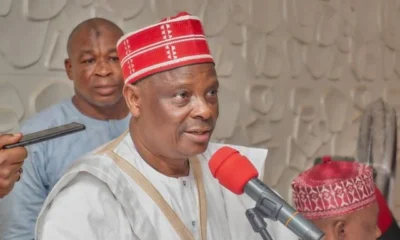

Road To 2027: We’ll Ensure APC Gets Less Than 15k Votes — Kwankwaso
-


JUST IN: Jigawa State Governor Loses 24-Yr-Old Son A Day After Mother’s Demise
-
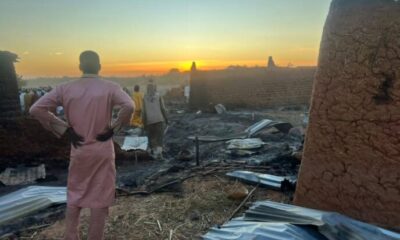

Sokoto Counters Military, Says 10 Civilians Accidentally Killed In Air Strike
BIG STORY
Aare Adetola Emmanuelking Shines Bright As The Remo Day “Man Of Steeze” [PHOTOS]
Published
6 mins agoon
December 28, 2024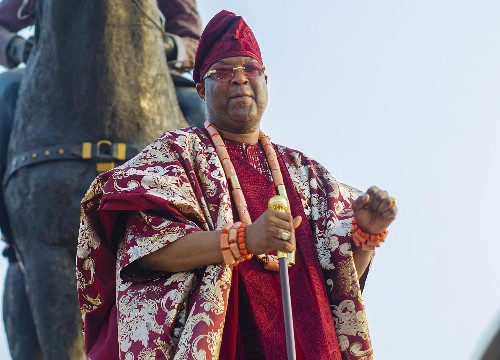
The Gateway Stadium, Sagamu was aglow yesterday, the 27th of December, 2024, as the maiden edition of Remo Day culminated in a grand rally celebrating the unity, culture, and progress of Remoland. Hosted by the revered Akarigbo of Remoland, the event brought together dignitaries from across the nation, including the Chief of Staff to the President of Nigeria, Hon Femi Gbajabiamila, the esteemed Governor of Ogun State, Prince Dapo Abiodun (MFR) and the first lady of the state, The Ewusi of Makun, HRH Oba Timothy Oyesola Akinsanya, ORUNAGBA II, Chairman of Adron Group and Otun Akile of Remoland Aare Adetola Emmanuelking, amongst others.
Aare Adetola Emmanuelking’s presence stood out in class as he brought unparalleled style, sophistication, and charm to the occasion. Dubbed the ” Remo Day Man of Steeze,” Aare Adetola made an unforgettable entrance, draped in an exquisite wine agbada adorned with intricate embroidery, accessorized with traditional coral beads, and crowned with a regal fila. His look, a masterclass in cultural elegance, radiated confidence and pride in Yoruba heritage, instantly earning him admiration from the gathered audience. Known for his charisma and commitment to the development of Remoland, Aare Adetola was the epitome of poise and grandeur as he engaged with other top dignitaries and attendees. From his interactions to his overall demeanor, every aspect of his presence reflected a deep connection to his roots, and an unyielding passion for community growth.
Communities from across Remoland including Epe, Makun, Iperu, Irolu, Emuren, Ogere, Ikenne, Ilara, Ode remo, Isara, Ipara, Ilishan, Soyindo, Ijagba, Ado, Ode lemo, Ibido, Idena, Ogijo, Atayo, Eposo, Idado, Latawa, Oko, Ipoji, Lowa ibu, Igbepa, Ijoku, Iraye, Ilupeju, Iraniken, Okeselu, Simawa, Ilaye, Iraye, Agura, Igode, Sotubo, Ariye , Araromi, Imushin, Imeji, Agbehinsa , and many more, converged at the Gateway Stadium to pay homage to the Akarigbo of Remoland, a revered symbol of unity and cultural pride. This act of respect and solidarity emphasized the deep-rooted connection between the people and their traditional ruler as they celebrated the remarkable growth and development of Remo. Among the many groups, Iyaniwura Base stood out under the distinguished leadership of Aare Adetola Emmanuelking. Following in his illustrious footsteps, the group brought a splash of vibrance to the event, dazzling attendees with their matching cultural attires that reflected the rich traditions of Remoland. Their coordinated elegance and enthusiastic homage added a memorable touch to the grand celebration.
The Remo Day celebration, themed “In Unity & Culture, We Thrive,” was more than a cultural showcase. It was a celebration of the strength and progress of Remoland, featuring colorful displays of traditional dance, drumming, and artwork. Amid the festivity, Aare Adetola’s magnetic personality and gallant appearance was a true highlight of the day. The Grand Rally provided a perfect backdrop for celebrating individuals who embody the spirit of Remo’s advancement. In Aare Adetola Emmanuelking, Remo found a true cultural icon, someone who not only lives the values of the community, but also inspires others to embrace and promote its legacy with pride and dignity.
The Remo Day celebrations may have concluded, but the image of Aare Adetola, standing tall in his resplendent attire, remains etched in the memories of attendees. Aare Adetola Olaonipekun Emmanuelking- a name synonymous with grace, culture, and unshakable pride in Remoland’s illustrious heritage. Indeed, the “Remo Day Man of Steeze” has set a standard that will resonate far beyond Remoland.
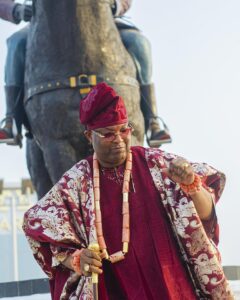
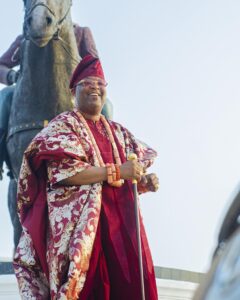

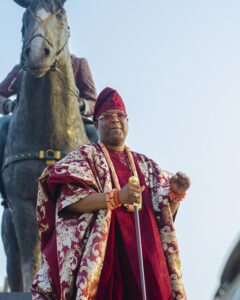


BIG STORY
“My NGO Account Has Been Hacked, N160Million Diverted” — VeryDarkMan
Published
1 day agoon
December 27, 2024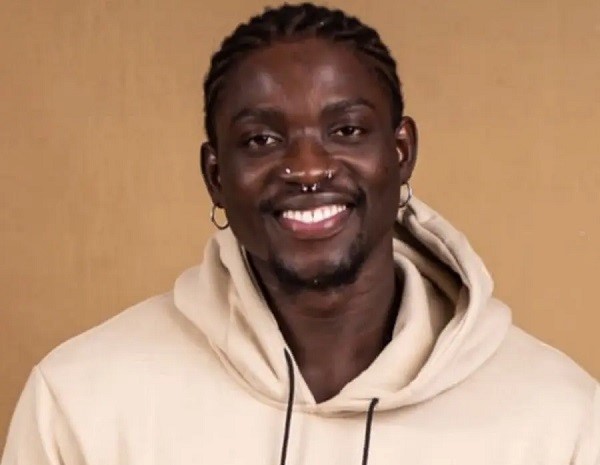
Popular activist and social critic, VeryDarkMan, has raised concerns about the hacking of his NGO account, which led to the diversion of N160 million.
In a video shared on his verified Instagram account on Friday, he revealed that the incident had left him feeling distressed in recent days.
He explained that the funds were stolen after hackers allegedly gained access to the NGO’s website. The compromised account, which initially contained N180 million, now holds only N20 million.
He mentioned that law enforcement agencies had tracked one of the suspects, resulting in an arrest.
To address the situation, he stated that the NGO’s app had been temporarily taken offline for maintenance to prevent further vulnerabilities.
He said, “For the past few days, I’ve not been myself. I am here with Officer Joe, and we are going to Jos. NGO money—somebody stole the money. Somebody hacked into the NGO website, and I don’t know how they did it. N180 million is missing, but thank God we have tracked the person, and we are on our way to Jos.
“They have arrested one person, and that is why I’m even saying it now. I’m excited, and the account has been put on PND. The account now has N20 million, while N160 million has been diverted to another account. We are currently going there to see how we can get the money back. I just want to update you people.
“I even had to shut down the app and put it on maintenance so that people will not really see what is going on, but let me just come out plain and tell everyone what is going on. Hopefully, we will get the money back.”
The NGO, which launched in October, gained significant attention after raising over N21 million within 24 hours of its inception.
The initiative, aimed at transforming Nigeria’s public education system, attracted support from prominent figures, including music producer Don Jazzy.
BIG STORY
Christmas Celebrations: Police Arrest 23 Suspected Armed Robbers, Hoodlums, Kidnapper, Recover Dangerous Weapons [PHOTOS]
Published
1 day agoon
December 27, 2024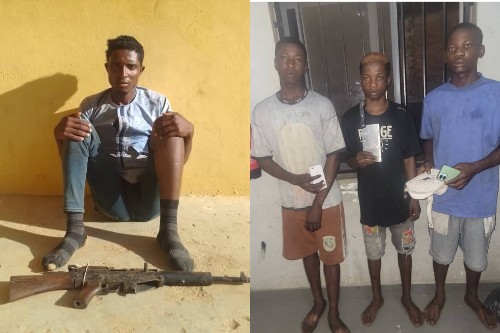
- As IGP Commends Officers For Vigilance, Commitment To Safety
In furtherance of the directive of the Inspector-General of Police, IGP Kayode Adeolu Egbetokun, Ph.D., NPM., to commands and formations to emplace unalloyed anti crime strategies towards ensuring adequate safety and security during this festive period, operatives of the Nigeria Police Force across several states in the country have successfully apprehended multiple groups of armed robbers, cultists and hoodlums targeting fun seekers and engaging in gangsterism during Christmas celebrations.
On the 25th of December 2024, at about 1am, the police operatives attached to Lagos State Command, received a distress call that a group of hoodlums armed with dangerous weapons was operating around the Safejo area of Amukoko, Lagos State. The swift response by the police operatives to the scene led to the arrest of 3 of the suspected hoodlums identified as Emmanuel Okoli ‘m’, 20 years, Ogunde Tejiri ‘m’, 20 years, and Emmanuel Orji ‘m’, 18 years, and also the recovery of the weapons they had used in carrying out robbery attacks on innocent funseekers in the area. The police have emplaced intensified searches to apprehend the fleeing members of the gang.
In a similar development, Police Operatives attached to Saminaka Division of the Kaduna State Command on 25th December 2024, at about 8pm, successfully apprehended one Sule Muhammad ‘m’, 25 years, who has been actively involved in multiple kidnapping incidents within the Saminaka area. Further investigation led to the recovery of a fabricated AK-47 rifle from the suspect. The suspect confessed to being a member of a notorious kidnapping gang who had been evading arrest since the arrest of other gang members on August 16, 2024, until his recent arrest on 25th December 2024. Following cooperation received from Muhammad, efforts are in top gear to apprehend other members of his gang and recover more arms and ammunition in their identified camp. Commendable efforts of the Nigeria Police Operatives have also been witnessed in states including Delta, Ogun Katsina, Benue, FCT and Imo, leading to the arrests of several suspects in various locations during the Christmas celebration period.
The IGP has commended the officers involved in these operations for their vigilance and commitment to public safety, highlighting their display of exemplary dedication in safeguarding our communities, especially during this joyful season. The IGP urges the public to remain vigilant and report any suspicious activities to the authorities.
The IGP further assures citizens that the Force is fully committed to creating a safe environment for everyone as they partake in the joy and cheer of the holiday season. As the celebrations continue, the Nigeria Police Force remains steadfast in its mission to protect all citizens and ensure that the spirit of festivities during this period remains unmarred by criminal activities.
ACP OLUMUYIWA ADEJOBI, mnipr, mipra, fCAI,
FORCE PUBLIC RELATIONS OFFICER
FORCE HEADQUARTERS,
ABUJA.
27TH DECEMBER 2024.
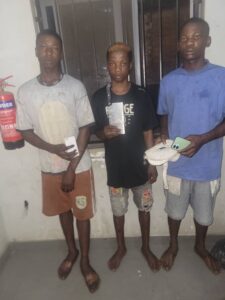
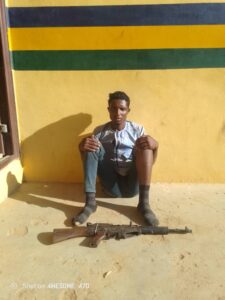
Most Popular
-

 BIG STORY4 days ago
BIG STORY4 days agoDeji Ogunsakin Launches The Better Life Foundation, Donates Food And Cash Gifts To Widows In Ado-Ekiti
-

 BIG STORY4 days ago
BIG STORY4 days agoJUST IN: Oriyomi Hamzat, Queen Naomi, School Principal Remanded In Agodi Prison Over Ibadan Stampede
-

 BIG STORY5 days ago
BIG STORY5 days agoTinubu To Hold First Presidential Media Chat Tonight
-

 BIG STORY2 days ago
BIG STORY2 days agoAdron Homes Celebrates Christmas With Customers, Reaffirms Commitment To Bridging Nigeria’s Housing Deficit
-

 BIG STORY1 day ago
BIG STORY1 day agoChristmas Celebrations: Police Arrest 23 Suspected Armed Robbers, Hoodlums, Kidnapper, Recover Dangerous Weapons [PHOTOS]
-

 BIG STORY4 days ago
BIG STORY4 days agoTax Reforms Here To Stay, But I Don’t Mind Making Concessions — President Tinubu
-

 BIG STORY4 days ago
BIG STORY4 days agoNo Regrets Removing Subsidy, Tax Reform Will Go Ahead — President Tinubu
-

 BIG STORY4 days ago
BIG STORY4 days agoJUST IN: Dele Farotimi Finally Released After 21 Days In Detention









